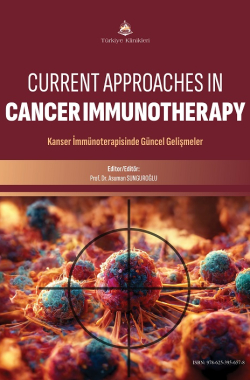Tumor Microenvironment and Immunotherapy
Nazila FARHANGZADa , Elif DENER KILIÇa,b, Asuman SUNGUROĞLUa
aAnkara University Faculty of Medicine, Department of Medical Biology, Ankara, Türkiye
bAnkara University Institute of Health Sciences, Ankara, Türkiye
Farhangzad N, Dener Kılıç E, Sunguroğlu A. Tumor microenvironment and immunotherapy. Sunguroğlu A, ed. Current Approaches in Cancer Immunotherapy. 1st ed. Ankara: Türkiye Klinikleri; 2025. p.53-8.
ABSTRACT
The tumor microenvironment (TME) is a complex and dynamic ecosystem that significantly influences tumor progression and response to therapies, particularly immunotherapy. It comprises various cellular components, including immune cells, fibroblasts, endothelial cells, and non-cellular elements such as the extracellular matrix (ECM). The TME can be categorized into immune-desert, immune-excluded, and immune-inflammatory environments, affecting tumor growth and immune responses differently. Tumor-associated macrophages (TAMs), cancer-associated fibroblasts (CAFs), and tumorassociated neutrophils (TANs) play crucial roles in modulating the TME by promoting immunosuppression, angiogenesis, and metastasis. Despite the promise of immunotherapy, the immunosuppressive nature of the TME limits its effectiveness. Strategies targeting TME components, such as TAM reprogramming, ECM remodeling, and immune checkpoint inhibition, are emerging as potential therapies to overcome these barriers and enhance the efficacy of cancer treatment. Understanding and manipulating the TME holds great potential for improving clinical outcomes in immunotherapy.
Keywords: TME; immunotherapy; TAM; CAF; ECM
Kaynak Göster
Referanslar
- Ma K, Wang L, Li W, Tang T, Ma B, Zhang L, et al.Turning cold into hot: emerging strategies to fire up the tumor microenvironment. Trends in Cancer. (2024). [Crossref]
- Zhang Y, Zhang Z. The history and advances in cancer immunotherapy: understanding the characteristics of tumor-infiltrating immune cells and their therapeutic implications. Cell Mol Immunol. 2020;17(8):807-21. [Crossref] [PubMed] [PMC]
- Xiao Y, Yu D. Tumor microenvironment as a therapeutic target in cancer. Pharmacol Ther. 2021;221:107753. [Crossref] [PubMed] [PMC]
- Sadeghi Rad H, Monkman J, Warkiani ME, Ladwa R, O'Byrne K, Rezaei N, et al. Understanding the tumor microenvironment for effective immunotherapy. Med Res Rev. 2021;41(3):1474-98. [Crossref] [PubMed] [PMC]
- Murciano-Goroff YR, Warner AB, Wolchok JD. The future of cancer immunotherapy: microenvironment-targeting combinations. Cell Res. 2020;30(6):507-19. [Crossref] [PubMed] [PMC]
- Marshall HT, Djamgoz MBA. Immuno-Oncology: Emerging Targets and Combination Therapies. Front Oncol. 2018;8:315. [Crossref] [PubMed] [PMC]
- Yang Q, Guo N, Zhou Y, Chen J, Wei Q, Han M. The role of tumor-associated macrophages (TAMs) in tumor progression and relevant advance in targeted therapy. Acta Pharm Sin B. 2020;10(11):2156-70. [Crossref] [PubMed] [PMC]
- Chen Y, Song Y, Du W, Gong L, Chang H, Zou Z. Tumor-associated macrophages: an accomplice in solid tumor progression. Journal of biomedical science. 2019; 26:1-13. [Crossref] [PubMed] [PMC]
- Aras S, Zaidi MR. TAMeless traitors: macrophages in cancer progression and metastasis. British journal of cancer. 2017;117(11):1583-91. [Crossref] [PubMed] [PMC]
- Wiehagen KR, Girgis NM, Yamada DH, Smith AA, Chan SR, Grewal IS, et al. Combination of CD40 Agonism and CSF-1R Blockade Reconditions Tumor-Associated Macrophages and Drives Potent Antitumor Immunity. Cancer Immunol Res. 2017;5(12):1109-21. [Crossref]
- Ping Q, Yan R, Cheng X, Wang W, Zhong Y, Hou Z, et al. Cancer-associated fibroblasts: overview, progress, challenges, and directions. Cancer Gene Ther. 2021;28(9):984-99. [Crossref]
- Fang Z, Meng Q, Xu J, Wang W, Zhang B, Liu J, et al. Signaling pathways in cancer-associated fibroblasts: recent advances and future perspectives. Cancer Commun (Lond). 2023;43(1):3-41.
- Zhou SL, Yin D, Hu ZQ, Luo CB, Zhou ZJ, Xin HY, et al. A positive feedback loop between cancer stem-like cells and tumor-associated neutrophils controls hepatocellular carcinoma progression. Hepatology. 2019;70(4):1214-30. [Crossref]
- Geh D, Leslie J, Rumney R, Reeves HL, Bird TG, Mann DA. Neutrophils as potential therapeutic targets in hepatocellular carcinoma. Nat Rev Gastroenterol Hepatol. 2022;19:257-73. [Crossref]
- Yu SJ, Ma C, Heinrich B, Brown ZJ, Sandhu M, Zhang Q, et al. Targeting the crosstalk between cytokine-induced killer cells and myeloid-derived suppressor cells in hepatocellular carcinoma. J Hepatol. 2019;70:449-57. [Crossref] [PubMed] [PMC]
- Zhao X, Zhang Y. Dendritic cell-based cancer immunotherapy: From basic research to clinical application. Frontiers in Immunology. 2020; 11:2851.
- Vermi W, Riboldi E. Tumor microenvironment and dendritic cell function in cancer immunotherapy. Frontiers in Immunology. 2021;12:670396.
- Lei K. et al. Mechanical immunoengineering of T cells for therapeutic applications. Acc. Chem. Res. 2020;53: 2777-90. [Crossref]
- Śledzińska A, Vila de Mucha M, Bergerhoff K, Hotblack A, Demane DF, Ghorani E, et al. Regulatory T Cells Restrain Interleukin-2- and Blimp-1-Dependent Acquisition of Cytotoxic Function by CD4+ T Cells. Immunity. 2020;52(1):151-166.e6. [Crossref] [PubMed] [PMC]
- Maskalenko NA, Zhigarev D, Campbell KS. Harnessing natural killer cells for cancer immunotherapy: dispatching the first responders. Nat Rev Drug Discov. 2022;21(8):559-77. [Crossref] [PubMed] [PMC]
- Liu D, Badeti S, Dotti G, Jiang JG, Wang H, Dermody J, et al. The role of immunological synapse in predicting the efficacy of chimeric antigen receptor (car) immunotherapy. Cell Commun Signal. 2020;18(1):134. [Crossref] [PubMed] [PMC]
- Halford S, Veal GJ, Wedge SR, Payne GS, Bacon CM, Sloan P, et al. A Phase I Dose-escalation Study of AZD3965, an Oral Monocarboxylate Transporter 1 Inhibitor, in Patients with Advanced Cancer. Clin Cancer Res. 2023;29(8):1429-39. [Crossref] [PubMed] [PMC]
- Mechtersheimer S, Scheel A. Extracellular matrix and cancer: A review of the molecular mechanisms underlying ECM remodeling and its effects on tumor progression. Cancer Research. 2021;81(2):305-18.
- Mai Z, Lin Y, Lin P, Zhao X, Cui L. Modulating extracellular matrix stiffness: a strategic approach to boost cancer immunotherapy. Cell Death Dis. 2024;15(5):307. [Crossref] [PubMed] [PMC]

